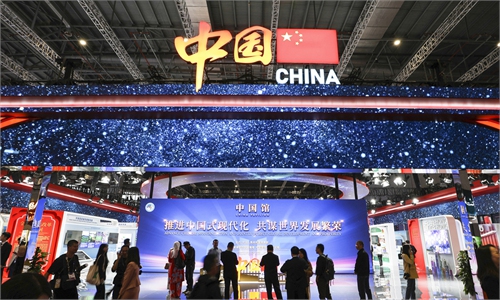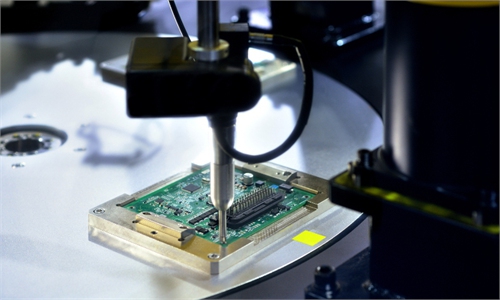
Illustration: Tang Tengfei/GT
International semiconductor firms, including ASML, Advanced Micro Devices (AMD) and Qualcomm, are showcasing some of their latest products at the 7th China International Import Expo (CIIE) in Shanghai this week, the South China Morning Post (SCMP) reported on Thursday. This participation underscores their commitment to the Chinese market, despite ongoing US pressure to restrict chip trade with China.In the face of arbitrary US restrictions and disruptions in global semiconductor trade, these companies continue to flexibly adjust their strategies and maintain close cooperation with the Chinese market. This approach reflects a recognition of China's vast market potential and irreplaceable position in the global semiconductor industrial chain.
Many of these international semiconductor enterprises are regular participants in the CIIE, the world's largest import expo. Their involvement reflects a strategic effort to expand operations within the rapidly growing market of the world's second-largest economy.
Dutch chip equipment manufacturer ASML has participated in the CIIE six times, while American company AMD has participated for four years. Qualcomm has maintained a steady presence at the CIIE, participating each year since the expo was launched seven years ago, according to media reports.
"This marks our sixth participation in the CIIE ... This annual event continuously demonstrates China's commitment to openness and collaboration, aligning perfectly with ASML's corporate culture," ASML Executive Vice-president Shen Bo was quoted by the SCMP as saying.
Despite ongoing geopolitical disruptions, ASML's share of revenue from the Chinese market has remained high. Sales in China accounted for 47 percent of ASML's total in the third quarter, Reuters reported in October, citing the company's financial report.
China stands as one of the largest consumer markets for semiconductors worldwide. Long-term demand for semiconductor products, particularly mature process chips, is expected to remain robust. As the global information sector is shifting from digitization to intelligent development, rapidly growing artificial intelligence (AI) applications and other emerging sectors are further driving the development of the semiconductor industry of China.
In 2024, driven by AI applications, the global semiconductor industry has shown signs of a recovery, with China showing fast-growing demand. In the first 10 months, China imported 2.24 trillion yuan ($313 billion) worth of integrated circuits, a year-on-year increase of 13 percent. During the same period, integrated circuit exports amounted to 931.17 billion yuan, a year-on-year increase of 21.4 percent, according to Chinese customs statistics.
China's role in the highly globalized semiconductor industry is indispensable. The Korea Chamber of Commerce and Industry's Sustainable Growth Initiative stated in a report that China continues to function as a hub for global semiconductor manufacturing supply chains, noting that the trade interdependence among semiconductor powerhouses, excluding the US, remains high, making it difficult to quickly restructure supply chains centered around the US and its allies, the Yonhap News Agency reported in October.
The semiconductor industry and electronic product supply chain in the Asia-Pacific region are deeply interconnected, with various stakeholders sharing common interests across different segments of the industrial chain. As a crucial link in the global supply chain, China engages in close industrial collaboration with countries like Japan and South Korea, which are home to prominent semiconductor companies. This partnership serves the mutual interests of all parties involved, making it resilient to potential disruptions from external geopolitical factors.
While the US continues to tighten export restrictions on the semiconductor sector with China, it is also aggressively coercing and limiting other countries' normal trade and supply chain cooperation with China in this field. However, these actions have faced increasing skepticism and a backlash from semiconductor enterprises from other countries, including US allies.
For global semiconductor companies, including those in the US, the groundless "security threat" hype propagated by some American politicians has become increasingly dubious. In this context, more and more semiconductor companies from various countries are expected to show a continuous interest in the Chinese market.
The author is a reporter with the Global Times. bizopinion@globaltimes.com.cn



